Exploring the Significance of Informed Consent in Healthcare Law
VerifiedAdded on 2023/06/12
|6
|1113
|319
Essay
AI Summary
This essay examines the critical role of patient consent in medical decision-making within the frameworks of medical law and ethics. It defines patient consent, emphasizing the necessity for it to be voluntary, informed, and capacitated. The essay outlines various types of consent, including informed, expressed, implied, tacit, surrogate, advance, and proxy consent, detailing their relevance in different medical scenarios. It addresses situations where patient consent is not required, such as emergency treatments or public health risks. Ultimately, the essay underscores the importance of patient consent in protecting legal rights, promoting ethical medical practices, and upholding patient autonomy, self-determination, and inviolability. Medical providers have a duty to inform patients about treatment benefits, risks, and alternatives, ensuring patients can make informed decisions.
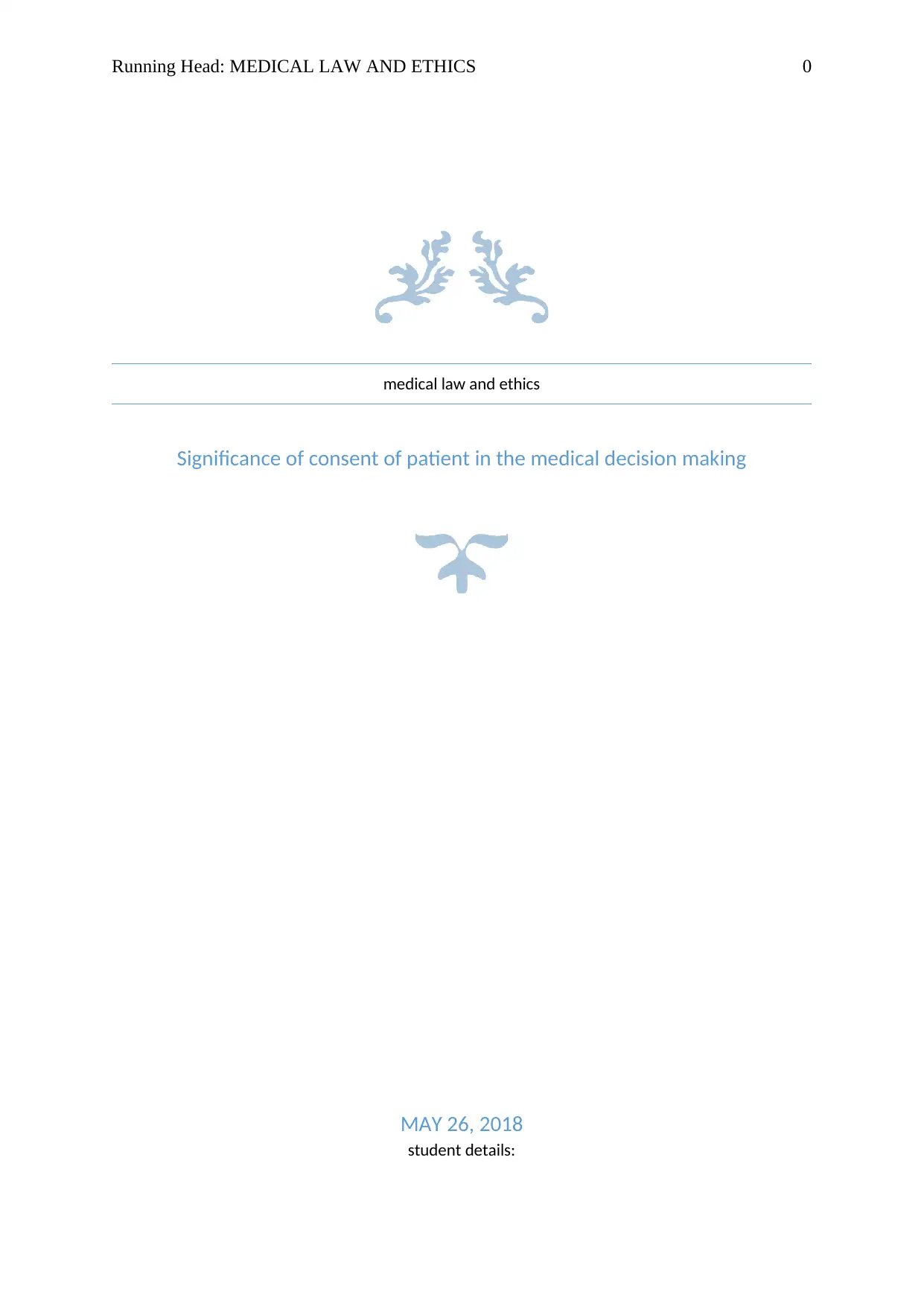
Running Head: MEDICAL LAW AND ETHICS 0
medical law and ethics
Significance of consent of patient in the medical decision making
MAY 26, 2018
student details:
medical law and ethics
Significance of consent of patient in the medical decision making
MAY 26, 2018
student details:
Paraphrase This Document
Need a fresh take? Get an instant paraphrase of this document with our AI Paraphraser
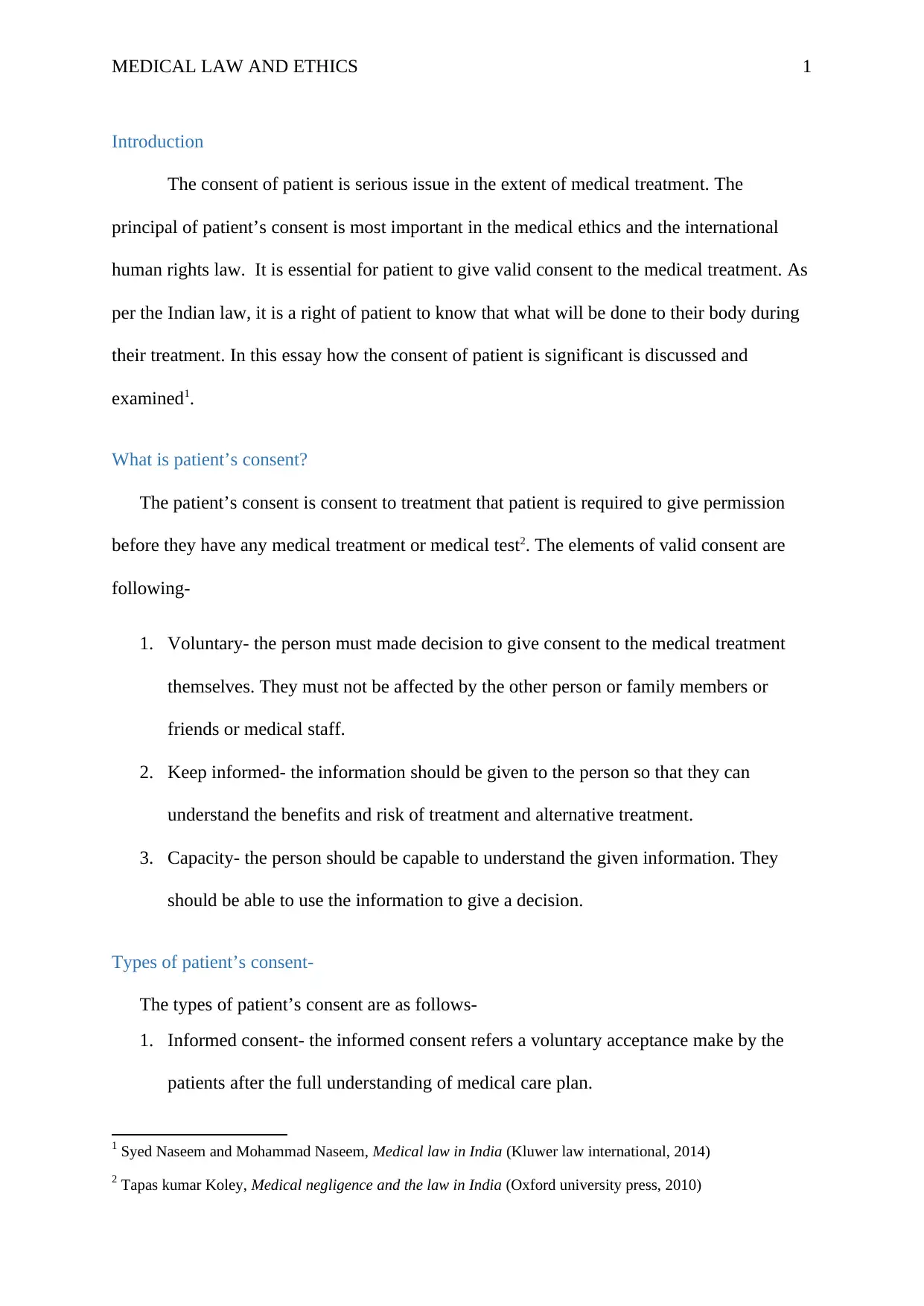
MEDICAL LAW AND ETHICS 1
Introduction
The consent of patient is serious issue in the extent of medical treatment. The
principal of patient’s consent is most important in the medical ethics and the international
human rights law. It is essential for patient to give valid consent to the medical treatment. As
per the Indian law, it is a right of patient to know that what will be done to their body during
their treatment. In this essay how the consent of patient is significant is discussed and
examined1.
What is patient’s consent?
The patient’s consent is consent to treatment that patient is required to give permission
before they have any medical treatment or medical test2. The elements of valid consent are
following-
1. Voluntary- the person must made decision to give consent to the medical treatment
themselves. They must not be affected by the other person or family members or
friends or medical staff.
2. Keep informed- the information should be given to the person so that they can
understand the benefits and risk of treatment and alternative treatment.
3. Capacity- the person should be capable to understand the given information. They
should be able to use the information to give a decision.
Types of patient’s consent-
The types of patient’s consent are as follows-
1. Informed consent- the informed consent refers a voluntary acceptance make by the
patients after the full understanding of medical care plan.
1 Syed Naseem and Mohammad Naseem, Medical law in India (Kluwer law international, 2014)
2 Tapas kumar Koley, Medical negligence and the law in India (Oxford university press, 2010)
Introduction
The consent of patient is serious issue in the extent of medical treatment. The
principal of patient’s consent is most important in the medical ethics and the international
human rights law. It is essential for patient to give valid consent to the medical treatment. As
per the Indian law, it is a right of patient to know that what will be done to their body during
their treatment. In this essay how the consent of patient is significant is discussed and
examined1.
What is patient’s consent?
The patient’s consent is consent to treatment that patient is required to give permission
before they have any medical treatment or medical test2. The elements of valid consent are
following-
1. Voluntary- the person must made decision to give consent to the medical treatment
themselves. They must not be affected by the other person or family members or
friends or medical staff.
2. Keep informed- the information should be given to the person so that they can
understand the benefits and risk of treatment and alternative treatment.
3. Capacity- the person should be capable to understand the given information. They
should be able to use the information to give a decision.
Types of patient’s consent-
The types of patient’s consent are as follows-
1. Informed consent- the informed consent refers a voluntary acceptance make by the
patients after the full understanding of medical care plan.
1 Syed Naseem and Mohammad Naseem, Medical law in India (Kluwer law international, 2014)
2 Tapas kumar Koley, Medical negligence and the law in India (Oxford university press, 2010)
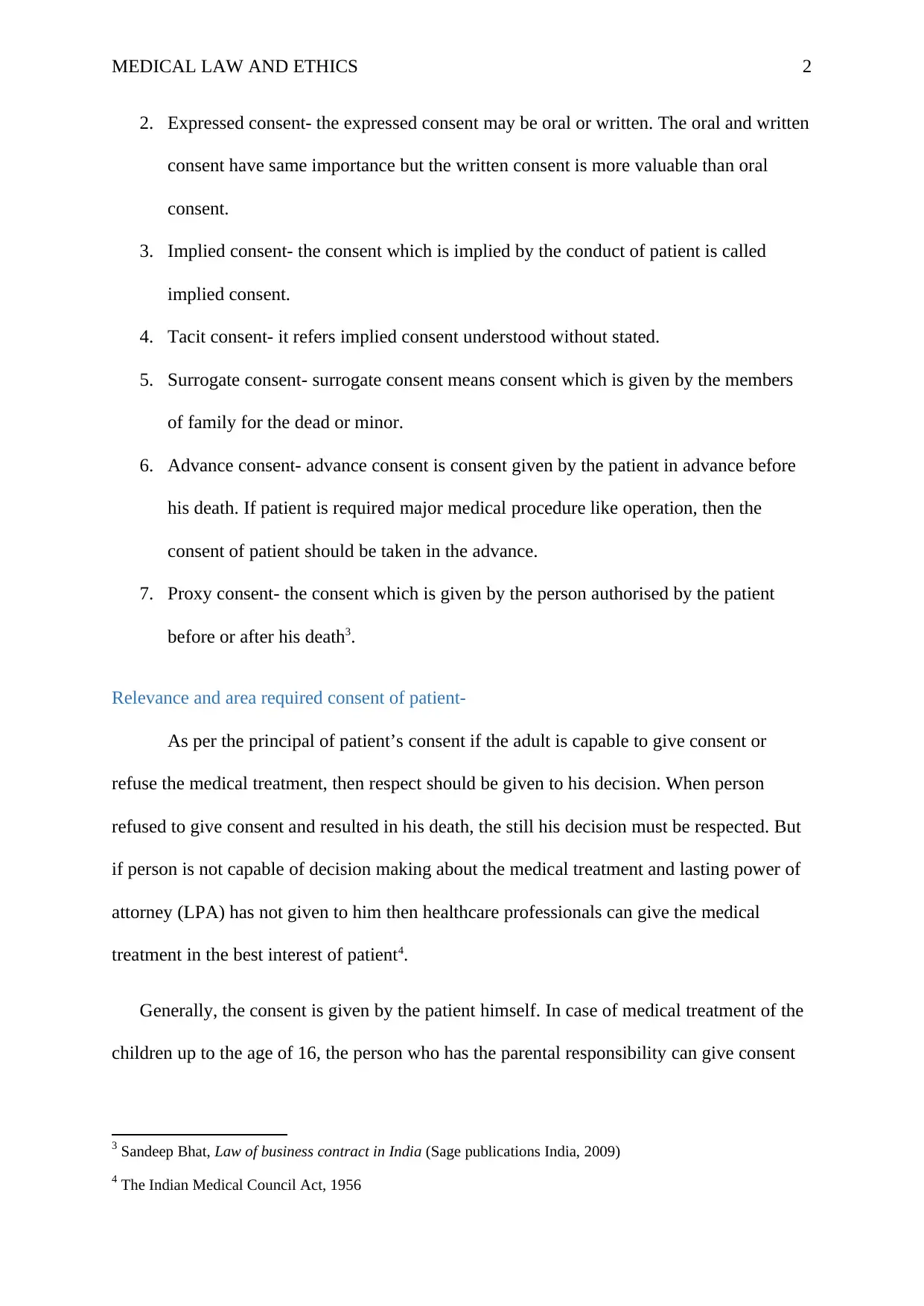
MEDICAL LAW AND ETHICS 2
2. Expressed consent- the expressed consent may be oral or written. The oral and written
consent have same importance but the written consent is more valuable than oral
consent.
3. Implied consent- the consent which is implied by the conduct of patient is called
implied consent.
4. Tacit consent- it refers implied consent understood without stated.
5. Surrogate consent- surrogate consent means consent which is given by the members
of family for the dead or minor.
6. Advance consent- advance consent is consent given by the patient in advance before
his death. If patient is required major medical procedure like operation, then the
consent of patient should be taken in the advance.
7. Proxy consent- the consent which is given by the person authorised by the patient
before or after his death3.
Relevance and area required consent of patient-
As per the principal of patient’s consent if the adult is capable to give consent or
refuse the medical treatment, then respect should be given to his decision. When person
refused to give consent and resulted in his death, the still his decision must be respected. But
if person is not capable of decision making about the medical treatment and lasting power of
attorney (LPA) has not given to him then healthcare professionals can give the medical
treatment in the best interest of patient4.
Generally, the consent is given by the patient himself. In case of medical treatment of the
children up to the age of 16, the person who has the parental responsibility can give consent
3 Sandeep Bhat, Law of business contract in India (Sage publications India, 2009)
4 The Indian Medical Council Act, 1956
2. Expressed consent- the expressed consent may be oral or written. The oral and written
consent have same importance but the written consent is more valuable than oral
consent.
3. Implied consent- the consent which is implied by the conduct of patient is called
implied consent.
4. Tacit consent- it refers implied consent understood without stated.
5. Surrogate consent- surrogate consent means consent which is given by the members
of family for the dead or minor.
6. Advance consent- advance consent is consent given by the patient in advance before
his death. If patient is required major medical procedure like operation, then the
consent of patient should be taken in the advance.
7. Proxy consent- the consent which is given by the person authorised by the patient
before or after his death3.
Relevance and area required consent of patient-
As per the principal of patient’s consent if the adult is capable to give consent or
refuse the medical treatment, then respect should be given to his decision. When person
refused to give consent and resulted in his death, the still his decision must be respected. But
if person is not capable of decision making about the medical treatment and lasting power of
attorney (LPA) has not given to him then healthcare professionals can give the medical
treatment in the best interest of patient4.
Generally, the consent is given by the patient himself. In case of medical treatment of the
children up to the age of 16, the person who has the parental responsibility can give consent
3 Sandeep Bhat, Law of business contract in India (Sage publications India, 2009)
4 The Indian Medical Council Act, 1956
⊘ This is a preview!⊘
Do you want full access?
Subscribe today to unlock all pages.

Trusted by 1+ million students worldwide
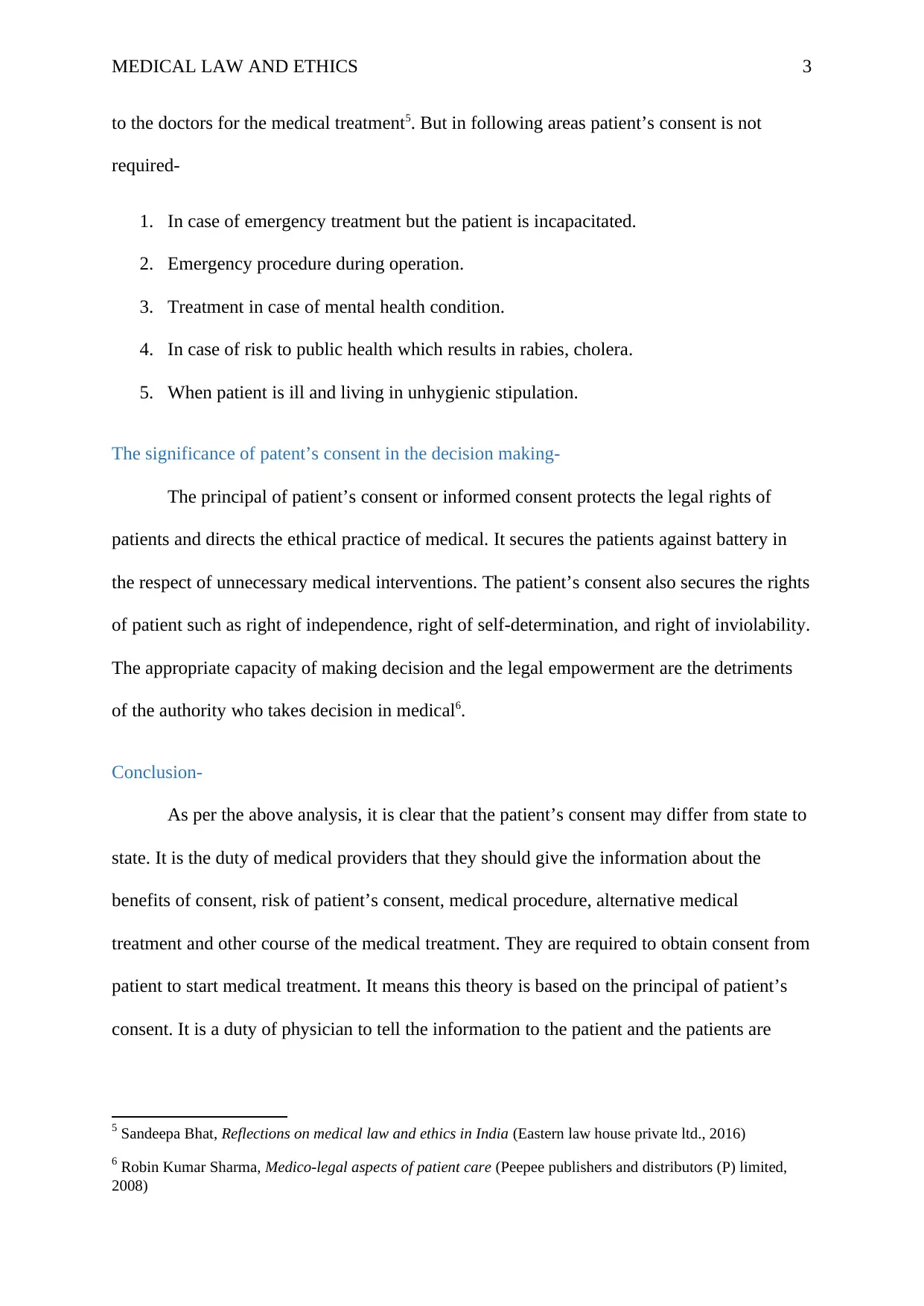
MEDICAL LAW AND ETHICS 3
to the doctors for the medical treatment5. But in following areas patient’s consent is not
required-
1. In case of emergency treatment but the patient is incapacitated.
2. Emergency procedure during operation.
3. Treatment in case of mental health condition.
4. In case of risk to public health which results in rabies, cholera.
5. When patient is ill and living in unhygienic stipulation.
The significance of patent’s consent in the decision making-
The principal of patient’s consent or informed consent protects the legal rights of
patients and directs the ethical practice of medical. It secures the patients against battery in
the respect of unnecessary medical interventions. The patient’s consent also secures the rights
of patient such as right of independence, right of self-determination, and right of inviolability.
The appropriate capacity of making decision and the legal empowerment are the detriments
of the authority who takes decision in medical6.
Conclusion-
As per the above analysis, it is clear that the patient’s consent may differ from state to
state. It is the duty of medical providers that they should give the information about the
benefits of consent, risk of patient’s consent, medical procedure, alternative medical
treatment and other course of the medical treatment. They are required to obtain consent from
patient to start medical treatment. It means this theory is based on the principal of patient’s
consent. It is a duty of physician to tell the information to the patient and the patients are
5 Sandeepa Bhat, Reflections on medical law and ethics in India (Eastern law house private ltd., 2016)
6 Robin Kumar Sharma, Medico-legal aspects of patient care (Peepee publishers and distributors (P) limited,
2008)
to the doctors for the medical treatment5. But in following areas patient’s consent is not
required-
1. In case of emergency treatment but the patient is incapacitated.
2. Emergency procedure during operation.
3. Treatment in case of mental health condition.
4. In case of risk to public health which results in rabies, cholera.
5. When patient is ill and living in unhygienic stipulation.
The significance of patent’s consent in the decision making-
The principal of patient’s consent or informed consent protects the legal rights of
patients and directs the ethical practice of medical. It secures the patients against battery in
the respect of unnecessary medical interventions. The patient’s consent also secures the rights
of patient such as right of independence, right of self-determination, and right of inviolability.
The appropriate capacity of making decision and the legal empowerment are the detriments
of the authority who takes decision in medical6.
Conclusion-
As per the above analysis, it is clear that the patient’s consent may differ from state to
state. It is the duty of medical providers that they should give the information about the
benefits of consent, risk of patient’s consent, medical procedure, alternative medical
treatment and other course of the medical treatment. They are required to obtain consent from
patient to start medical treatment. It means this theory is based on the principal of patient’s
consent. It is a duty of physician to tell the information to the patient and the patients are
5 Sandeepa Bhat, Reflections on medical law and ethics in India (Eastern law house private ltd., 2016)
6 Robin Kumar Sharma, Medico-legal aspects of patient care (Peepee publishers and distributors (P) limited,
2008)
Paraphrase This Document
Need a fresh take? Get an instant paraphrase of this document with our AI Paraphraser

MEDICAL LAW AND ETHICS 4
required to listen carefully. In case if they do not understand the given information then they
can ask for more details and information.
required to listen carefully. In case if they do not understand the given information then they
can ask for more details and information.
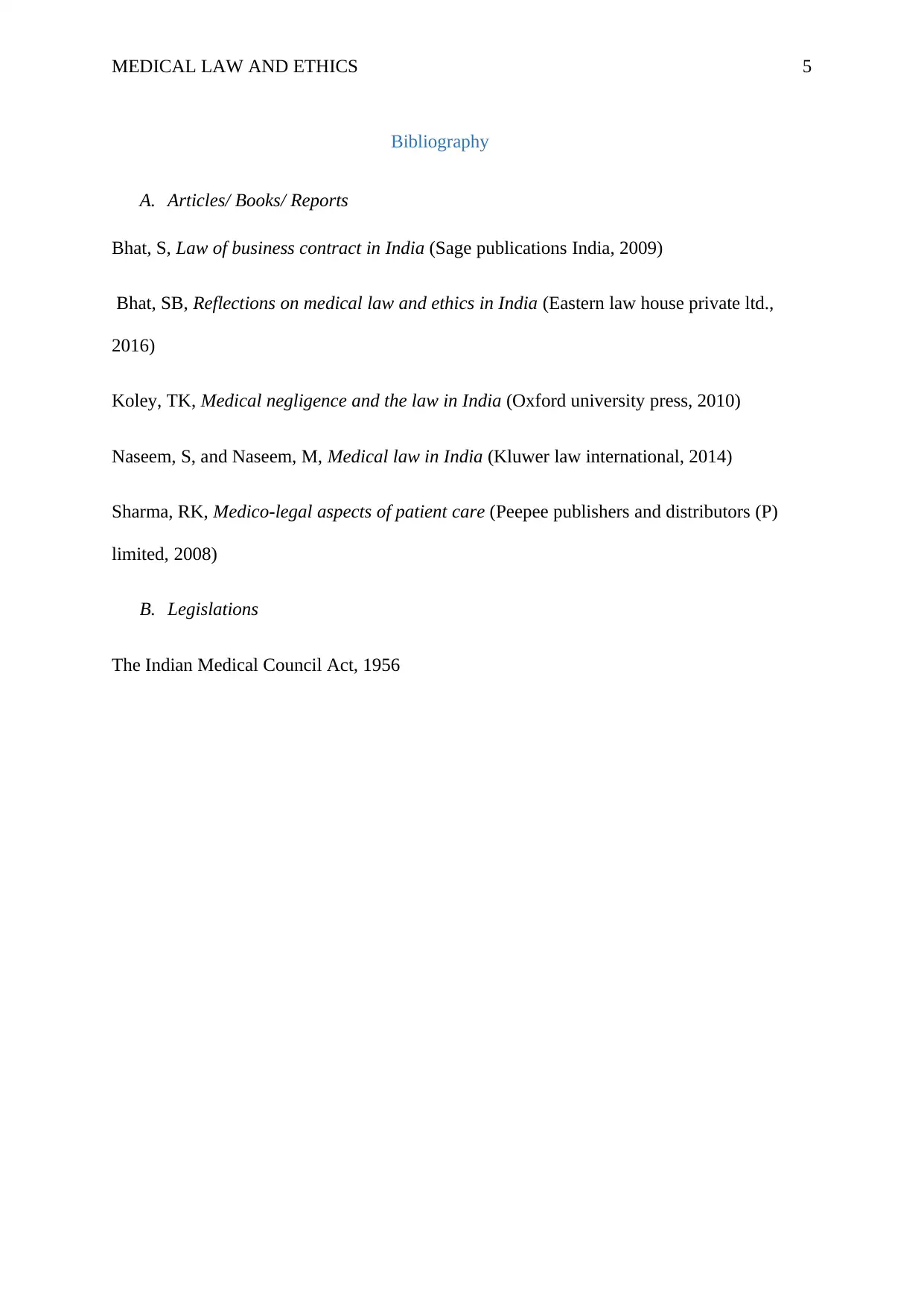
MEDICAL LAW AND ETHICS 5
Bibliography
A. Articles/ Books/ Reports
Bhat, S, Law of business contract in India (Sage publications India, 2009)
Bhat, SB, Reflections on medical law and ethics in India (Eastern law house private ltd.,
2016)
Koley, TK, Medical negligence and the law in India (Oxford university press, 2010)
Naseem, S, and Naseem, M, Medical law in India (Kluwer law international, 2014)
Sharma, RK, Medico-legal aspects of patient care (Peepee publishers and distributors (P)
limited, 2008)
B. Legislations
The Indian Medical Council Act, 1956
Bibliography
A. Articles/ Books/ Reports
Bhat, S, Law of business contract in India (Sage publications India, 2009)
Bhat, SB, Reflections on medical law and ethics in India (Eastern law house private ltd.,
2016)
Koley, TK, Medical negligence and the law in India (Oxford university press, 2010)
Naseem, S, and Naseem, M, Medical law in India (Kluwer law international, 2014)
Sharma, RK, Medico-legal aspects of patient care (Peepee publishers and distributors (P)
limited, 2008)
B. Legislations
The Indian Medical Council Act, 1956
⊘ This is a preview!⊘
Do you want full access?
Subscribe today to unlock all pages.

Trusted by 1+ million students worldwide
1 out of 6
Related Documents
Your All-in-One AI-Powered Toolkit for Academic Success.
+13062052269
info@desklib.com
Available 24*7 on WhatsApp / Email
![[object Object]](/_next/static/media/star-bottom.7253800d.svg)
Unlock your academic potential
Copyright © 2020–2026 A2Z Services. All Rights Reserved. Developed and managed by ZUCOL.





